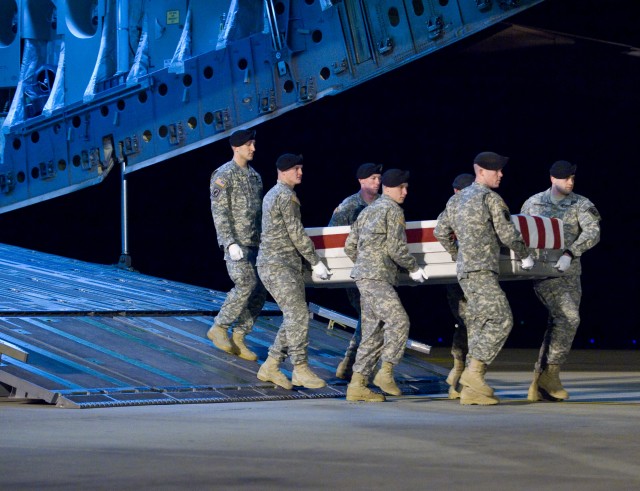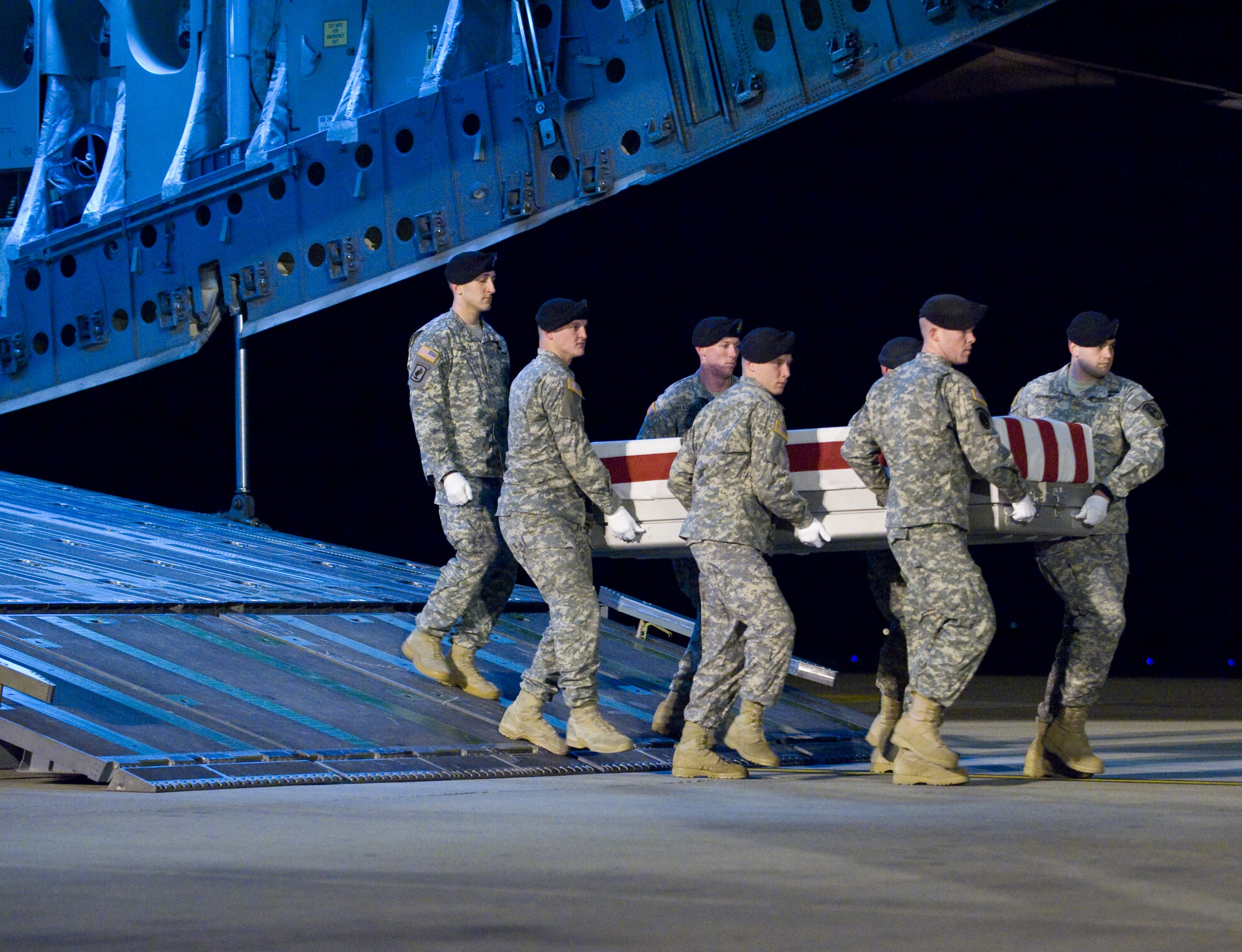Each week, a squad of Soldiers from the 3rd U.S. Infantry Regiment (The Old Guard) is set aside from the typical ceremonial tasking to take upon itself a most difficult honor. These Soldiers are on call, 24 hours a day, weekday or weekend, to receive the remains of America's fallen heroes at Dover Air Force Base in Dover, Del.
Sometimes, if it's been a good week, no call will come in, and the Soldiers will know that for one week, no Soldier was killed while serving overseas. But too often, several calls come in one week, and the Soldiers begin to prepare themselves to give the fallen Soldier a dignified return to their country.
In the first week of the new year, the noncommissioned officer in charge of the Dover team was Staff Sgt. Bradley J. Falls of Company D, 1st Battalion, 3rd U.S. Infantry Regiment (The Old Guard). During the second week of January alone, Falls and his men carried transfer cases containing 11 fallen Soldiers from airplanes to mortuary trucks waiting to take the Soldiers to the Air Force Mortuary Affairs Operations Center at Dover Air Force Base to be prepared for their funerals.
Once he receives the mission, Falls and six other Soldiers from Company D begin to ready themselves for the mission. They prepare themselves physically, getting into uniform and going over the steps required to execute a proper transfer.
The Soldiers on the team wear the Army Combat Uniform when they go to Dover. The Soldiers also wear white cotton gloves, the same gloves they wear when rendering honors in Arlington National Cemetery.
The reason for this uniform is for practical reasons, said Capt. Michael Frank, the officer in charge of ceremonies for The Old Guard. Because there is so much time spent in preparation, and because the Soldiers fly to Dover in Blackhawk helicopters, wearing the ACU is much more practical than wearing the ceremonial blues uniform the Soldiers wear when rendering final honors in Arlington National Cemetery. The Soldiers wear the gloves so they can better grip the casket.
Once they get the call, the Soldiers typically spend about eight hours preparing and executing the mission, said Falls. Since the flights arrive in Dover at all hours, the Soldiers often transfer the remains of their fallen comrades in the dead of night.
Although the hours are long and irregular, Falls said he and his Soldiers appreciate the opportunity to do their part in ensuring that these heroes are returned to the United States with the dignity and respect they deserve.
"It's important to me," he said. "Being in this unit is not just a job. It's an honor. I have been on both sides of the playing field - I have many fallen friends. I served in Afghanistan with the 173rd (Airborne Brigade Combat Team based in Vincenza, Italy). I've had friends and colleagues who have fallen in battle. I know what this service we do for the family means to them. It's not for us - it's to honor that Soldier and their family for making the ultimate sacrifice."
Although it is an honor to be able to be able to give back to the Soldiers who have died fighting in Iraq and Afghanistan, being so close to tragedy is difficult as well, said Falls.
"I'll never forget the first one," he said. "It hit me hard, especially since I've experienced the loss myself. To us, my team, this is the first time they (the fallen) have touched U.S. soil since they've passed. You've got the family - the family's watching, their grieving their loved ones. It's a very emotional time for everyone. We all feel it."
Pfc. Roger Halford, a casket bearer from Company D and a member of Falls' Dover team, remembers well his most difficult Dover mission, which happened a year ago. "I had to carry a close friend of mine. I didn't know in advance that I would know who I was carrying. I knew I had to carry a brother in arms, but I didn't know who it was until I got there and realized he was a friend from high school.
"It was a shock. I didn't react until later. I didn't want anyone to know, I didn't want to break ceremonial composure, to ruin it." In The Old Guard, "ceremonial composure" is defined as the ability to not allow personal feelings to show on a Soldier's face. Soldiers must remain stoic while performing in ceremonies, and they are trained well to maintain their composure no matter the circumstance.
Breaking ceremonial composure would have been a letdown to his friend, his friend's family, the Army, his fellow casket bearers, and himself, said Halford. "If I had not been proficient at my task, if I was not able to maintain myself, it would have looked disgraceful to his family and friends. It wouldn't have been honorable. That's why I want to stay sharp and straight - so that their friends and family will see the honor."
Halford found the best way to not react to the situation was to focus on the physical aspects of his task. "Clench teeth tightly, concentrate on the steps I'm taking, right face, left face, where I'm going. Concentrate on what I'm doing - the physical movements, the keeping a straight face. You have to stay with the job."
Halford has been an Old Guard Soldier for almost two years now. When he joined the Army, he did not expect to be dressed in the ceremonial blue uniform daily, rendering final honors in Arlington National Cemetery. Sometimes, he wishes he were in a unit that focused on deploying, rather than being a part of the Army's premier ceremonial unit.
"It takes a mental toll on a person to see these headstones in ANC, these caskets. It really wears a person down. It makes you question what's going on, what you can do to help, what can be done better to prevent the loss of our comrades," he said.
Although the task is mentally and emotionally exhausting, Halford believes being a part of The Old Guard has helped him grow. "It makes you a better person," he said. "I don't take my life for granted like I did before I joined the Army. I definitely hold life to a higher value now."
And he hopes Americans recognize what he sees. "I hope that everyone knows that these men and women we're trying to show honor to have earned it, that they've paid that price. Freedom costs."


Social Sharing